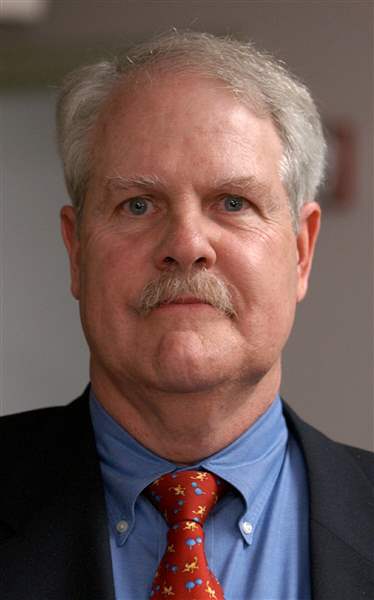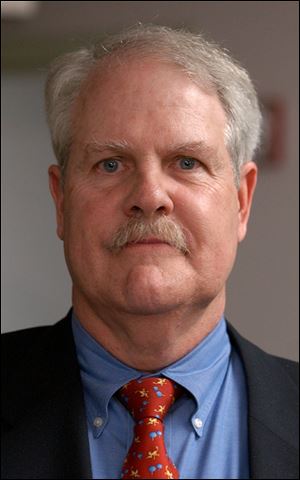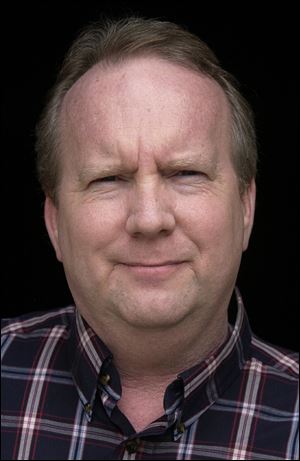
Embattled zoo leaders call it quits
Director Dennler retires; operations chief to resign
5/5/2005
Executive Director William Dennler is retiring effective immediately.
THE BLADE
Buy This Image

Executive Director William Dennler is retiring effective immediately.
Two months of uproar at the Toledo Zoo culminated yesterday in the sudden retirement of William Dennler, the zoo's executive director for the past 24 years, and the announcement of the resignation of Mr. Dennler's chief assistant.

Chief Operating Officer Robert Harden will resign after working with a “new executive team” to find a zoo director.
Mr. Dennler's retirement, effective immediately, comes amid a controversy the executive triggered in February when he fired the zoo's popular chief veterinarian, Tim Reichard, a 22-year veteran of the zoo.
Robert Harden, the zoo's chief operating officer who has been with the zoo three years, "will work with the new executive team to assure a smooth transition," said Stephen Staelin, president of the zoo's board of directors.
Mr. Harden will step down after the transition is complete.
Severance packages for the two men, if there are to be any, have not been worked out, the board president said.
Mr. Staelin said Mr. Dennler initiated his departure from the zoo.
The decision was not influenced by the board or in any way tied to the agreement the zoo board made last weekend with Dr. Reichard. Under that agreement, the veterinarian was "reinstated."
The unusual reinstatement agreement pays Dr. Reichard $126,700, including lost wages; salary and benefits for the next 18 months, and reimbursement for legal fees.
But the veterinarian will be a consultant, forbidden to set foot on zoo grounds even as a private citizen for the next six months.
"Bill [Dennler] told me today of his intent to retire, effective immediately," Mr. Staelin said. "He has agreed to work with the board's interim leadership team to assure smooth management transition."
Until a new executive is chosen -- a search Mr. Staelin estimates could take from six months to a year -- the zoo will be managed by an executive team made up of board members and current zoo employees.
A new director will be someone with an extensive background in animal management, Mr. Staelin said.
Just how management will be structured, and whether the new administrator will act as a senior curator, will be determined after an executive is hired, he said.
But one change that seems certain is a loss in power and status for a group known as the biological program committee.
1975: William Dennler begins working at the Toledo Zoo as curator of reptiles.
1981: Mr. Dennler is promoted to zoo executive director, just after ownership is transferred from the city of Toledo to a not-for-profit organization.
1982: Mr. Dennler hires Dr. Tim Reichard to serve as the zoo's head veterinarian.
1988: Giant pandas go on display, after zoo officials successfully negotiate with the Chinese government.
2000: Medusa the sloth bear dies after being put in a den without food or water.
2001: George the giraffe dies after it is gored by a gazelle-like kudu.
2002: Mr. Dennler hires Robert Harden as the zoo's chief operations officer.
2003: Cupid the hippo dies.
February, 2004: Unannounced USDA inspection, in which Dr. Reichard is interviewed concerning his responsibilities at the zoo and animal care issues.
March, 2004: Zoo internal investigation finds that communication problems, among other things, contributed to the death of George the giraffe.
May, 2004: 14-acre Africa! exhibit opens.
February, 2005: Dr. Reichard is terminated, following several written reprimands.
March 17, 2005: The zoo board meets with Dr. Reichard and, at the same meeting, forms two committees: one to review the ex-vet's firing, and a second to study zoo corporate culture.
April 30, 2005: Settlement is reached with Dr. Reichard, paying him around $127,000, expunging his record, and preventing him from speaking about the zoo.
May 4, 2005: Mr. Dennler retires. Mr. Harden resigns.
Since the zoo lost its senior curator with the resignation of assistant director Doug Porter in 2001, the zoo has turned all animal welfare decisions over to this committee.
The committee, whose voting members included the curators of mammals, birds, reptiles, and fishes, along with an animal behavior specialist, had a chairmanship that rotated among the four curators.
Left out of the picture was the zoo's veterinary staff, which could attend the meetings but not vote nor chair the committee.
This was believed by some staff members to be at the heart of many problems at the zoo and the source of some of the friction between Dr. Reichard and zoo administrators.
"We lost accountability in that process, accountability and continuity," Mr. Staelin said. "The recommendation of the [zoo board's] culture committee is we move away from that particular structure."
A committee of some sort may remain, but it will be led by a permanent chairman with overall responsibility for animal-welfare questions, he said.
The firing of Dr. Reichard and subsequent revelations about zoo operations prompted Lucas County commissioners to establish a citizens' task force to investigate the zoo. Among the revelations were details about past animal deaths and zoo spending practices that provided Mr. Dennler and Mr. Harden with Volvos that cost the publicly funded zoo more than $1,200 per month.
Robert Reinbolt, chairman of the county task force, said Mr. Dennler's retirement will not stop the task force's efforts.
"We will proceed right on. We're interested in talking to keepers and curators. We'll keep moving forward. The question is, who's going to run the zoo now?"
Zoo employees were shocked by the announcement yesterday.
"I don't know what to think," said Deb Pepard, a veterinary technician. "I'm still trying to get over the Dr. Tim thing."
"At this point, it seems like change is needed," said Nicole Chiles, a keeper in the small-mammal department. "It will probably take a while for everything to settle down. But the zoo is bigger than any one person."
"I'm not sure if I want to work here if Dennler's gone," said Mike Dilley, an associate curator of primates. "He put the zoo where it is today. That's very disturbing."
Dr. Reichard would not comment last night, according to his wife, Sue.
Tina Skeldon Wozniak, president of the Lucas County commissioners, said last night that she was informed of the decisions by Mr. Staelin and was told that they were happening "in the best interests of the institution."
"I'm hopeful the zoo will benefit from a new perspective," Ms. Wozniak said. "I'm excited about the future of the zoo."
She said the task force "will continue its work to provide recommendations for the betterment of the zoo as a stellar institution in the community."
As for Mr. Dennler and Mr. Harden, she said, "Change is probably a good thing at this time. I wish them well."
County Commissioner Pete Gerken said he was not surprised by last night's announcement.
"When we started looking at the zoo as an institution, I think from our conversations it was time for a change.
"The communications seemed to be fractured internally," he said. "There was distrust between the curators and the keepers. There also seemed to be a lack of accountability when it came to expenses and expenditures.
"The zoo will survive quite nicely, I am sure," Mr. Gerken said.
Dr. Reichard's financial settlement and accompanying gag order did not sit well with local residents.
"There were raised eyebrows," Mr. Gerken said.
Commissioner Maggie Thurber said: "I am not disappointed. I am not surprised."
Mrs. Thurber said she could not pass judgment on Mr. Dennler's performance. "I don't want to do that because I don't know."
But she added: "If you have someone as embattled as much as Mr. Dennler was, I think that it is a compliment to an individual who says they will quit immediately because he believes it is in the best interest of an institution."
Mayor Jack Ford said last night that the departures of Mr. Dennler and Mr. Harden were predictable.
With the zoo likely to ask voters in the fall to approve a capital funding levy, Mayor Ford said, "I think they just reached a point it was time to move on.
"I think in the sweep of things, while there have been some miscues and problems, we will see the good things that progressed over the last generation," Mayor Ford said. "Now it is time for somebody new to come in and take the zoo to the next level." the mayor said.
Marty Skeldon, a co-chairman of that 14-member citizens' task force that the county commissioners established in March, said he was saddened by Mr. Dennler's departure, noting that the director worked hard for the zoo from the day Mr. Skeldon's father hired him.
"It takes long hours of work and endless dedication" to make an operation such as the Toledo Zoo succeed, Mr. Skeldon said.
"Perhaps there were some mistakes made, but it's still a wonderful zoo and a source of pride for the community," he said.
"The taxpayers should be reassured that we'll seek answers to their questions, and the zoo will emerge better than ever," Mr. Skeldon said.
Steve Pollick, a member of the task force who also is The Blade's outdoors editor, said the departures were a surprise.
He said that Mr. Skeldon got a cell-phone call during the task force's executive session last night and passed the news along in between interviews.
Mr. Pollick said he feels confident that the zoo board wants the best for the institution.
"I'm sure that Steve Staelin and the board have their hearts and minds in the right place," he said.
Mr. Pollick said his main concern is that the zoo board, the task force, and the community at large "keep our collective eyes on the prize," keeping the zoo one of the community's signature institutions.
He said the zoo became a nationally regarded institution on Mr. Dennler's watch.
"I am very concerned about [the zoo's future] because for so many years, in many ways, the zoo was Bill Dennler and Bill Dennler was the zoo," he said.
"In a personal sense, I'm concerned for him and his personal welfare and I wish him well," Mr. Pollick said.
Task force member R. Michael Frank said the panel was "absolutely not" consulted about the changes.
He said the resignations, which he learned of unofficially early last night, will not make a difference to the task force's ongoing work.
The task force, he said, is not about individuals, and its members have not been discussing issues that are specifically related to one individual or another. It is focused on animal care, he said.
Mr. Frank would not speculate on any effect the changes would have. "I wouldn't even want to say whether it was a good thing or a bad thing," he said.
"It may change things at the zoo, from one administration to another, that's a given, but it won't affect what we were asked to do," Mr. Frank said.
Blade staff writers Tad Vezner, Jack Baessler, David Patch, Elizabeth Shack, and Tom Troy contributed to this report.
Contact Jenni Laidman at:
jenni@theblade.com
or 419-724-6507.